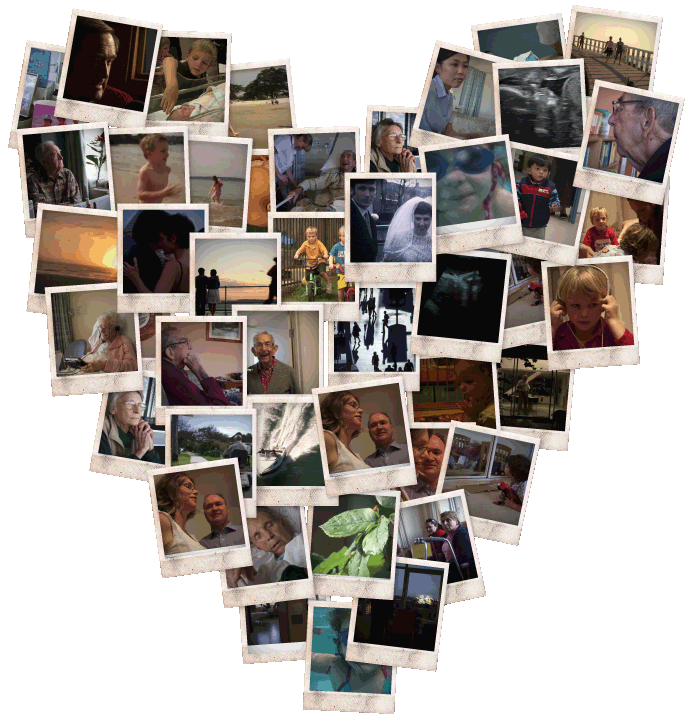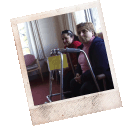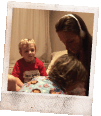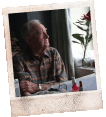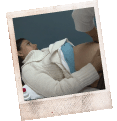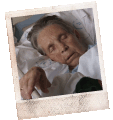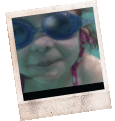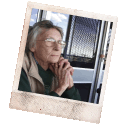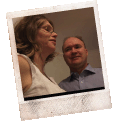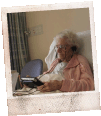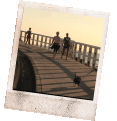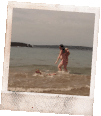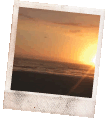Synopsis
Love in Our Own Time is a documentary about the extraordinariness of ordinary life, and visits those moments both simple and sublime that compose the lives we lead.
Following seven ordinary Australian families we travel the length and breadth of human experience and bear witness to lives both beginning and ending.
Love in Our Own Time follows an ensemble cast of characters: John, who has just retired and is about to explore the world with his much loved wife, finds out instead that he has terminal cancer and must live out the rest of his life in a few short, sweet months. Kate and Daniel are approaching the other end of life with the birth of their fifth and final child. Meanwhile seventy-five year old Jutta’s life springs into focus as her loving family gathers to hold vigil over her last days. At a nearby birth centre Fiona and Mel are excited at the prospect of meeting their second child, while eighty-something Doug is determined to leave hospital and spend his last days at home with his family. Watching over all of these comings and goings at the hospital is Noelene, to whom life is a ‘very strange’ and interesting business.
Interwoven through these powerful stories and others is a journey to the heart of what it is to be human.
Funded through Australia’s premier cultural filmmaking fund at Screen Australia – Love in Our Own Time is a film that speaks directly to its audience about the nature of life and death. It is a journey to the heart of what it is to be human that gives us all pause to question the lives we lead.
Themes
The problem of work-life balance is a core issue for us all, compounding the complexities of modern life. Finding meaning in lives and relationships that have been engulfed in modern busyness seems increasingly difficult, and despite all that is offered in our modern world, we seem further away than ever from living fully realised lives. In fact modern life seems at times to prevent us from grasping the most profound of life experiences: birth, love and death.
Through the lives of a group of ordinary Australian families, and some of the health professionals that support them, Love in Our Own Time investigates this dilemma.
The problem of work-family balance is real, social researcher Hugh Mackay has argued. ‘One of my survey respondents recently remarked: “I don’t think we’re trying to keep up with the Joneses — I think we’re trying to keep up with ourselves.”‘
Mackay wonders in response: ‘Perhaps it is time to take stock and ask ourselves why all this rushing, all this pressure, all this busyness? The ancient Latin poet Ovid may have got it right: “You who seek an end of love, love will yield to business: be busy and you will be safe.” Are we, as Ovid implies, merely trying to avoid the risks, the demands and the joys of love?’
This is a film about the coal-face of the work-family-life equation. It is a film about 21st Century Sydney through the eyes of families at critical junctures in their lives.
It is a film that will – in very stark terms – provide cause to reflect on what we are all frantically rushing towards.
Director’s statement
In recent years I have watched grandparents and family friends die and been struck, as newcomers to these experiences inevitably are, by the sense of helplessness and awe that accompanies our witness of death. While I’d previously been familiar with what death meant in an intellectual way it only now occurred to me just how much it remains at the limits of imagination and empathy until personally experienced.
It is a commonplace that in contemporary ‘western’ society we are very uncomfortable with death. Certainly in my own life I am conscious of having lived much of it under the self-delusion that it will never end: the ‘immortality complex’.
The two circumstances that have done most to shake this strange belief, however, has been the recent experience of the deaths of people close to me, and (equally as profoundly) spending the best part of a decade among the Yolngu Aboriginal people of NE Arnhem Land.
Commuting between Yolngu society and my own society of urban, predominantly Anglo, Sydney, provides a stark contrast between the cultural institutions of death. In Arnhem Land death remains a very constant (perhaps too constant in more recent times) fact of life. It is experienced out in the open, and is marked by long and involved ceremonies with the deceased that incorporate all of their kin and neighbouring clans.
Coming home to Sydney to watch the death of three grandparents in hospitals and nursing homes – where the death industries worked with such clinical efficiency that most of society never knew that anything momentous happened behind the closed curtains of dormitories and rooms – I was struck by how solitary and hidden was our urban experience of this most significant fact of life.
For this reason, and with some of the ethnographic skills learned through my engagement and film-making in Arnhem Land, Indonesia, West Africa and elsewhere, I wanted to turn a camera on my own tribe in this critical period – this time on the cusp of life.
While researching for the project I became aware of how similar people’s descriptions of witnessing birth and death were. A first-time parent describes a feeling for her new- born child as ‘like falling into a love I never knew existed’. A woman described caring for her dying husband as ‘like falling in love all over again’. In both cases, perhaps, a feeling so profound, so sublime, that its closest human description is love. This formed the basis of the film that became Love in Our Own Time.
I read of a woman who said: ‘It was quite spiritual. It was almost like watching a miracle.’ She might have been discussing the birth of a child, instead she was discussing the experience of watching her father die: ‘It seemed like Dad was being born but in a different way.’
I realise that I am not alone in wanting to examine this mysterious period of life that is so difficult to describe. While we live in a society where many people have never been challenged by the physical vision of birth and death, there is a growing interest within the arts to confront it. Books such as Helen Garner’s The Spare Room and Mark Wakely’s Sweet Sorrow confront us with the cold face of our own mortality, and internationally famous works such as Joan Didion’s The Year of Magical Thinking, or David Rieff’s memoir about the death of his mother, Susan Sontag, Swimming in a Sea of Death, explore the subject with great lucidity and candour. In Australia the Helen Ennis curated exhibition Reveries: Photography and Mortality also explored visions of death that were compelling, beautiful, and disturbing.
This growing body of work attests to how much we have become divorced from the fact of death, and to how much we crave to understand it. Love in Our Own Time is an attempt to investigate the context in which we live: the fact of our birth, and the fact of our inevitable death. It was an extremely humbling film to make and I very deeply thank all of those people who agreed to participate in the film and share their profound and private journeys of grief and joy with us.
Filmmakers
Director, Producer, Writer, Camera – Dr Tom Murray
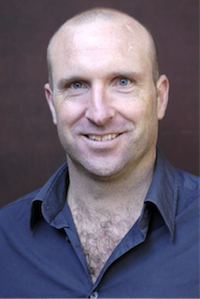 Dr Tom Murray is a filmmaker, writer and lecturer in screen production. His debut documentary film, Dhakiyarr vs the King, won the Dendy Award for Best Film at the 2004 Sydney Film Festival, the NSW Premier’s Award for History, and was selected for many international film festivals including the 2005 Sundance Film Festival.
Dr Tom Murray is a filmmaker, writer and lecturer in screen production. His debut documentary film, Dhakiyarr vs the King, won the Dendy Award for Best Film at the 2004 Sydney Film Festival, the NSW Premier’s Award for History, and was selected for many international film festivals including the 2005 Sundance Film Festival.
Tom’s 2008 film, In My Father’s Country, was selected for IDFA Amsterdam, won the 2008 Australian Directors Guild Award for Best Direction in a Documentary Feature and has screened at many of the world’s most prestigious film festivals. The film was made with assistance from Macquarie University and won the Vice Chancellor’s Commendation for Academic Excellence. Tom’s most recent film Love in Our Own Time was released in 2013.
Tom has lectured at numerous institutions in Australia and internationally. He currently works in the Department of Media at Sydney’s Macquarie University. He has extensive experience in facilitating media production in indigenous communites, including for ABC TV/ScreenWest, the Buku Larrngay Mulka Centre in NE Arnhem Land, and the Sharing Stories Project across Australlia. Tom has made a number of feature documentaries for ABC Radio National and his writing has appeared in numerous distinguished publications. His 2005 novel Fishing Secrets was shortlisted for the Vogel Australian Literary Award. In 2014, Tom was awarded the Max Crawford Medal.
Co-Director, Camera – Madeleine Hetherton
Madeleine Hetherton is an experienced director with a number of broadcast television documentary and drama credits. These include the successful documentary series for SBS’ Making Babies which broadcast nationally (‘fascinating and moving’, The Age), the 52 minute documentary Beats Across Borders for the ABC and Cirque du Soleil and several documentaries, part of the SBS television Keeping It Together series.
She has extensive experience making factual programs working for major Australian production companies such as Endemol Southern Star, IMG Media, Freehand TV & Cordell Jigsaw on many popular Australian series.
A graduate of the Australian Film, Television and Radio School (AFTRS) she was also a recipient of the Film Australia AFTRS Documentary Award. Madeleine is a photographer who exhibits regularly including the highly regarded Suburban Edge exhibition at the Australian Centre for Photography.
In an oddly synchronous way she found herself paralleling some of her characters stories, by giving birth to her first son Zeke during production!
Editor – Vanessa Milton
Vanessa Milton is an award-winning editor whose films have screened nationally on channels such as the ABC and SBS and been critically lauded and widely viewed. She has spent the last 10 years working as an editor of independently produced documentaries. Among her broadcast credits are Homemade History and Liberal Rule: the Politics that changed Australia for SBS and 14 Storeys for ABC.
In 2007 she won the Australian Film Institute award for best editing in a documentary for Forbidden Lie$, which screened in cinemas in Australia and the US, and more recently, Liberal Rule: the Politics that changed Australia won the 2010 AFI award for best documentary series. Her most recent documentaries: Nothing Rhymes with Ngapartji, Drive and Orchids: My Intersex Adventure, all screened on ABC-TV in 2011.
Composer – Caitlin Yeo
Caitlin Yeo is a unique and versatile film composer. Since graduating from a Graduate Diploma of Screen Composition at AFTRS in 2003, Caitlin has scored four feature films, including All My Friends are Leaving Brisbane and the recently released Jucy, which premiered at the Toronto Film Festival to sell-out audiences. She has also scored 18 TV documentaries including Feral Peril, Footy Chicks and The Matilda Candidate, two documentary series and many short films.
In 2011, Caitlin won an APRA professional development award, which included a coveted place in the ASCAP Film Scoring Workshop in LA.
In 2007, Caitlin won an APRA-AGSC Screen Music Award (Best Music for a Documentary) for her highly original score for Bomb Harvest, about an Australian bomb disposal expert in Laos. Caitlin was nominated again in 2008 for the same award, for the documentary The Last Trimate, and for a third time in 2010 for her score for The Long Goodbye.
Caitlin has an eclectic and emotive compositional style. She has a diverse musical background having performed in rock bands, orchestras, gypsy bands and gamelan groups. She is an accomplished accordionist, flautist and pianist, and spent her time during her bachelor degree at Sydney University focusing on 20th century composition and ethnomusicology.
